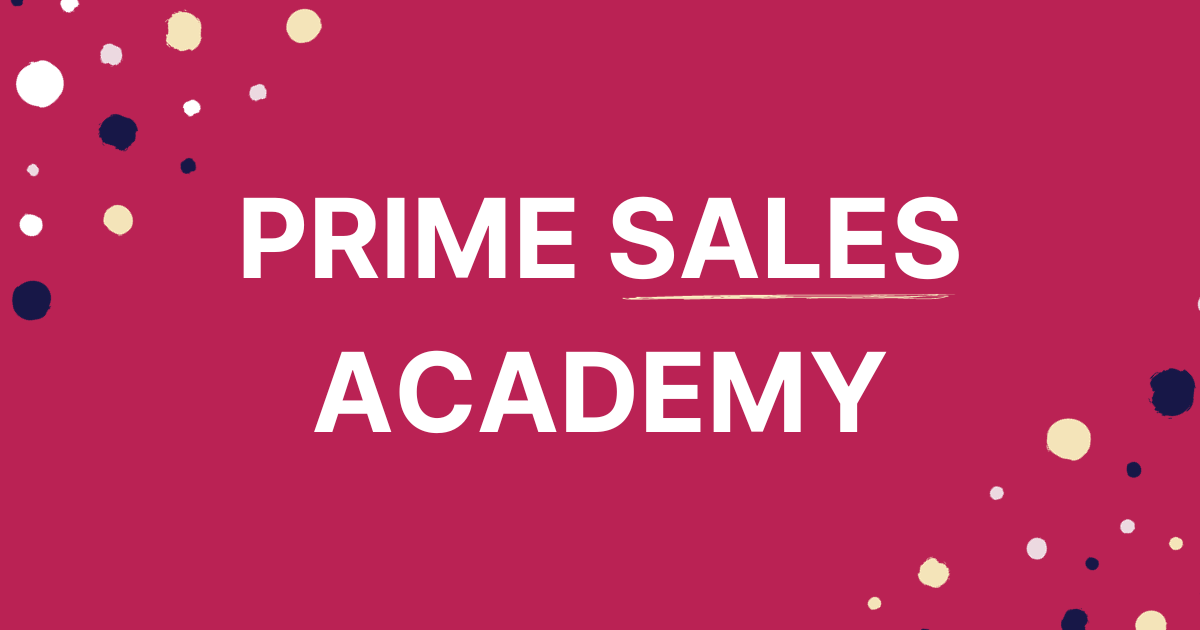Welcome To The Prime Sales Academy
We’ve launched the new Prime Sales Academy! A World-Class sales training experience that continues to guide aspiring SDRs to reach their full potential!
As the ISM BESMA award-winning sales training provider, we welcome you to the Prime Sales Academy.
The model was broken – and we’ve fixed it.
The thinking behind most Sales Academies or Apprenticeships is flawed. These flaws stem from a number of assumptions and oversights from training providers.
The first is the assumption that all new sellers need a broad education in the world of sales. The result is long-term programmes, covering the entire spectrum from prospecting to consultative or solution selling, negotiation, presentation skills, key account management and so on.
Most new salespeople don’t need these skills – or at least they don’t need them right now.
If you’ve taken on inexperienced sellers, there’s a good chance that their role for the first 6-12 months as a minimum will be prospecting; finding potential leads, engaging with potential decision makers, establishing an interest to move forward to the next stage and gaining commitment to a meeting / demo / attendance at an event.
Let’s be honest here, the role of an SDR (prospector, BDR or whatever role title you prefer) is tough!
What new entrants need to thrive in these roles are the skills, methods, techniques and processes to get themselves ahead – as well as developing the mindset and confidence to keep going on those days when it feels like they’re wading through treacle.
Training them on the principles of creating an effective account plan is not going to help them pick up the phone and make that next call.
The programme has to focus on the skills that they need and can implement right now. Everything else is fluff at this stage.
The second oversight, is that the design of the programme is often built with the efficiency of the training provider in mind – and not what is best for the learner.
It’s long been recognised that the human brain can only cope with a limited number of things at any one time: if you want to develop your sales capability, realistically there’s a rule of thumb that says you can only ever hope to change three things at any one time.
So attending a sales training course that last multiple days, particularly when they’re new to sales, will have a limited impact. They might learn ten new things, but if they can only apply three of them to their sales calls, then the time and opportunity in learning the other seven has been wasted.
Shorter, bite-size learning that allows for implementation and reinforcement, before going onto the next set of skills is proven to be a far more effective approach to skills development. ‘Little and often’ beats’ sporadic and protracted’ every time.
However, many training providers prefer the full day or multi-day approach, because it’s easier to manage, easier to programme and enables them to maximise the utilisation of their training resource. The programme is dictated by a drive for operational efficiency rather than effectiveness.
The best ROI comes from the programmes that have been built to prioritise learner success ahead of all other factors.
The third great oversight is the disconnect between the classroom (physical or virtual) and the sales arena. Too often training happens in isolation as the trainer follows the script, conducts some role play and then wishes the delegates luck until the next time they meet.
The follow up is performed, if at all, by a line manager who has little knowledge or access to the materials or sessions their salespeople have attended, few tools to support the implementation, and minimal useful interaction with the trainer. If a skills coach is appointed, it’s rarely the same person who delivered the training and, for the more formal qualifications, it can feel like the priority is filling out the forms rather than developing sales performance.
Moreover, the whole programme can start to feel like it’s a box-ticking exercise based around what they can document rather than focusing on what really matters in sales; are they hitting their targets?
We believe in sales programmes that deliver numbers not certificates.
It’s based on these beliefs and observations that the Prime Sales Academy was created.
Our Head of Sales Training, Steve Lowndes, sums up our thinking here:
“I see a lot of bright, hungry new entrants into sales, and it disappoints me that all too often they are set up to fail. What they need is the skills to enable them to master what is perhaps the toughest role in sales, enabling them to deliver the results that keeps that motivation and drive high. At Prime we are on a mission to ‘Change the Perception of Sales’ – I see it as my mission to support that by ‘Changing the Perception of Sales Training’. The Prime Sales Academy does that by focusing on exactly what new entrants need.”
We have created a sales Academy that addresses the traditional failings through the following core principles:
- Small group sizes that allow for tailoring and personal development
- Bite size learning – layering the skills for maximum impact on live calls
- Utilising call listening, performance analysis and line manager feedback to ensure skills learned are actively applied and delivering sales results
- Delivered by sales practitioners – skilled and experienced salespeople who design and deliver the programme (we are salespeople first and foremost)
But most important of all – the Prime Sales Academy is about the skills that they need right here, right now. Anything else is a distraction from the core aims that our clients want, our candidates want, and we want – namely we want new entrants into sales who:
Deliver better results, ramp up faster and stay for longer.
